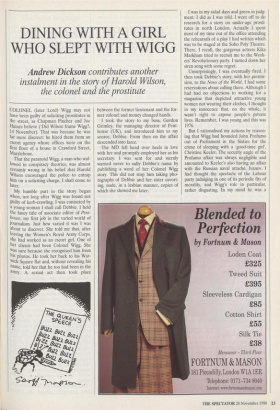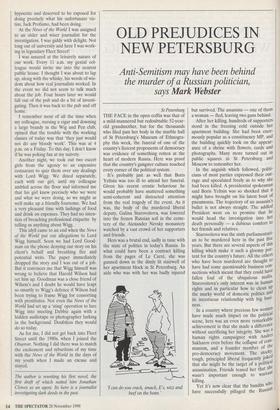DINING WITH A GIRL WHO SLEPT WITH WIGG
Andrew Dickson contributes another instalment in the stoiy of Harold Wilson, the colonel and the prostitute
COLONEL (later Lord) Wigg may not have been guilty of soliciting prostitutes in the street, as Chapman Pincher and Joe Haines believe (Did Wilson frame Wigg?, 14 November). That was because he was far more discreet: he hired them from an escort agency whose offices were on the first floor of a house in Crawford Street, Marylebone.
That the paranoid Wigg, a man who wal- lowed in conspiracy theories, was almost certainly wrong in his belief that Harold Wilson encouraged the police to entrap him on a soliciting charge, I shall come to later.
My humble part in the story began When, not long after Wigg was found not guilty of kerb-crawling, I was contacted by a young woman I shall call Debbie. I held the fancy title of associate editor of Pent- house, my first job in the varied world of Journalism. Just how varied it was I was about to discover. She told me that, after leaving the Women's Royal Army Corps, She had worked as an escort girl. One of her clients had been Colonel Wigg. She was sure because she recognised him from his photos. He took her back to his War- wick Square flat and, without revealing his name, told her that he too had been in the army. A sexual act then took place between the former lieutenant and the for- mer colonel and money changed hands.
I took the story to my boss, Gordon Grimley, the managing director of Pent- house (UK), and introduced him to my source, Debbie. From then on the affair descended into farce.
The MD fell head over heels in love with her and promptly employed her as his secretary. I was sent for and sternly warned never to sully Debbie's name by publishing a word of her Colonel Wigg story. This did not stop him taking pho- tographs of Debbie and her sister cavort- ing, nude, in a lesbian manner, copies of which she showed me later. I was in my salad days and green in judg- ment. I did as I was told. I went off to do research for a story on under-age prosti- tutes in north London. Actually I spent most of my time out of the office attending the rehearsals of a play I had written which was to be staged at the Soho Poly Theatre. There, I recall, the gorgeous actress Kika Markham tried to recruit me to the Work- ers' Revolutionary party. I turned down her siren song with some regret.
Unsurprisingly, I was eventually fired. I then took Debbie's story, with her permis- sion, to the News of the World. I had some reservations about calling there. Although I had had no objections to working for a magazine that depicted attractive young women not wearing their clothes, I thought in my innocence that, on the whole, it wasn't right to expose people's private lives. Remember, I was young and this was 1976.
But I rationalised my actions by reason- ing that Wigg had hounded John Profumo out of Parliament in the Sixties for the crime of sleeping with a 'good-time girl', Christine Keeler. The security angle of the Profumo affair was always negligible and amounted to Keeler's also having an affair with the Russian naval attaché, Ivanov. I had thought the spectacle of the Labour party indulging in one of its periodic fits of morality, and Wigg's role in particular, rather disgusting. In my mind he was a hypocrite and deserved to be exposed for doing precisely what his unfortunate vic- tim, Jack Profumo, had been doing.
At the News of the World I was assigned to an older and wiser journalist for the investigation. I was giddy with delight. Not long out of university and here I was work- ing in legendary Fleet Street!
I was amazed at the leisurely nature of our work. Every 11 a.m. my genial col- league would invite me into the nearest public house. I thought I was about to lap up, along with the whisky, his words of wis- dom about how real journalists worked. In the event we did not seem to talk much about the job. Four hours later we would fall out of the pub and do a bit of investi- gating. Then it was back to the pub and off home.
I remember most of all the time when my colleague, nursing a cigar and downing a large brandy in the Wig and Pen club, opined that the trouble with the working classes of today was that 'they just would not do any bloody work'. This was at 4 p.m. on a Friday. To this day, I don't know if he was poking fun at my naivety.
Another night, we took out two escort girls from the agency to an expensive restaurant to quiz them over any dealings with Lord Wigg. We dined separately, each with our girl, until my colleague ambled across the floor and informed me that his girl knew precisely who we were and what we were doing, so we might as well make up a friendly foursome. We had a very pleasant time with lashings of food and drink on expenses. They had no inten- tion of breaching professional etiquette by telling us anything about Wigg.
This idyll came to an end when the News of the World put our allegations to Lord Wigg himself. Soon we had Lord Good- man on the phone denying our story on his client's behalf and breathing fire and potential writs. The paper immediately dropped the story and I was out of a job. But it convinces me that Wigg himself was wrong to believe that Harold Wilson had set him up. Goodman was a close friend of Wilson's and I doubt he would have leapt so smartly to Wigg's defence if Wilson had been trying to frame Wigg for consorting with prostitutes. Not even the News of the World had set up a 'sting' operation to lure Wigg into meeting Debbie again with a hidden audiotape or photographer lurking in the background. Doubtless they would do so today.
As for me, I did not get back into Fleet Street until the 1980s, when I joined the Observer. Nothing I did there was to match the excitement and sybaritism of my time with the News of the World in the days of my youth when I made an excuse and stayed.
The author is rewriting his first novel, the first draft of which netted him Jonathan Clowes as an agent. Its hero is a journalist investigating dark deeds in the past.



























































































 Previous page
Previous page